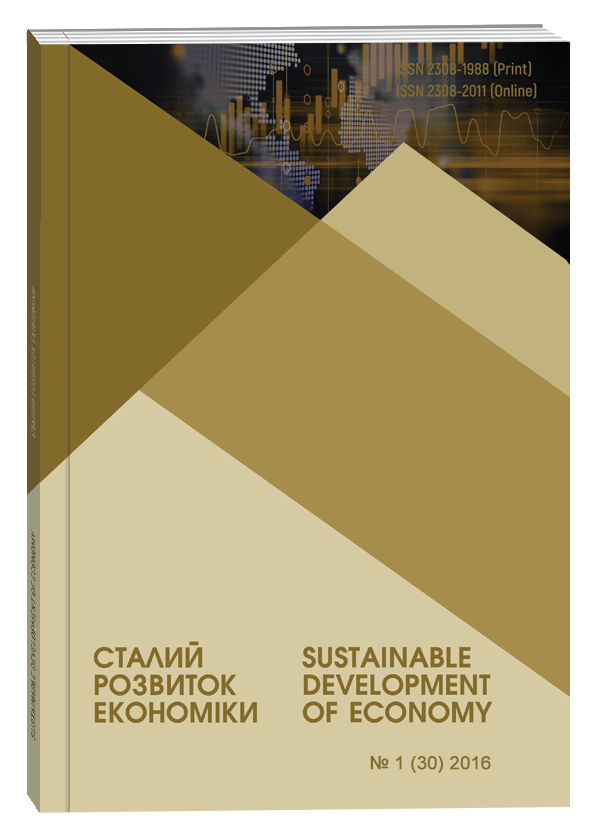THE CONSEQUENCES OF SOUTHERN EUROPEAN DEBT CRISIS AND THE MECHANISMS FOR ITS OVERCOMING
Abstract
Purpose. The aim of the article is to highlight the consequences of southern European debt crisis and identify effective the mechanisms for its overcoming. Methodology of the study. General scientific methods were used in the research process (for the study of the theoretical foundations of the mechanisms to overcoming the consequences of the debt crisis); analysis (in determining the dynamics of economic indicators of the country); systematic and comparative analysis (for comparison of anti-crisis policy of southern European countries). Findings. It has been revealed that the main reasons for the emergence of southern European debt crisis are: failure to comply with “problematic” countries of the Maastricht criteria; high budget deficit; the growth of foreign debt that significantly higher than the critical level; capital flight abroad; disparities in economic development of the EU member states. Another reason for spread of the crisis is the loss of investor confidence to the Eurozone countries. Bonds Italy, Greece, Portugal contain significant risk that prevents the inflow of capital from other countries. The effects of the debt crisis, which include: reduction in the level of GDP, decline in production and rising unemployment are analyzed in the article. It has been established that decline in asset prices occurred in the Eurozone countries that was caused by the introduction of stringent credit conditions and the decline in international trade in this group of countries due to a significant decrease in the proportion of durable goods in trade turnover. The mechanisms for overcoming the consequences of debt crisis, the main ones are: structural reforms; financial innovations; partial privatization; debt restructuring. Originality. A comparative analysis of application of the mechanisms for overcoming the debt crisis of southern European countries has been conducted. Practical value. The obtained results of research aimed at overcoming the consequences of the debt crisis.
References
International Monetary Fund [Electronic recourse]. – Mode of access: http://www.imf.org/external/index.htm.
Schäfer H.-B. The Sovereign Debt Crisis in Europe, Save Banks Not States [Electronic recourse] / H.-B. Schäfer. – Mode of access: http://ssrn.com/abstract=2049299.
Lewis M. Boomerang – Travels in the New Third World / M. Lewis. – W. W. Norton & Co, 2012. – 224 p.
Simkovic M. Bankruptcy Immunities, Transparency, and Capital Structure / M. Simkovic // Presentation at the World Bank. – 11 January, 2013.
Feldstein M. The French Don’t Get It [Electronic recourse] / M.Feldstein. – Mode of access: http://www.project-syndicate.org/commentary/the-french-don-t-get-it.
Alderman L., Craig S. Europe’s Banks Turned to Safe Bonds a Costly Illusion [Electronic recourse]. – Mode of access: http://www.nytimes.com/2013/11/11/business/global/sovereign-debt-turns-sour-in-euro- zone.html?_r=2&pagewanted=1&hp.
Trading Economics [Electronic recourse]. – Mode of access: http://www.tradingeconomics.com.
Решота О. Фінансова криза Єврозони та основні шляхи її подолання / О. Решота, В. Решота // Збірник наукових праць. – 2012. – Вип. 31. – С. 265-272.
Гаркуша К. Боргова криза в ЄС: основні гравці та строки закінчення / К. Гаркуша // Наукові праці Чорноморського державного університету імені Петра Могили. – 2012. – Т. 198, Вип. 186. – С. 118-122.
Боргова криза в Європейському Союзі [Електронний ресурс]. – Режим доступу : http://www.ufin.com.ua/analit_mat/drn/159.htm.
«Рука помощи» от ЕС: Греции могут дать еще млрд евро [Электронный ресурс]. – Режим доступа : http://atn.ua/ekonomika/ruka-pomoshchi-ot-es-grecii-mogut-dat-eshche-86-milliardov.
Николюк В. Європейська боргова криза : виклик для економік Центрально-Східної Європи / В. Николюк // Сталий розвиток економіки. – 2013. – №3. – С. 64-67.
Portugal: Second Review Under the Extended Arrangement / IMF Country Report No. 11/363. – December 2011. – 129 p.
Слав’юк Н. Боргові кризи в країнах Європейського Союзу / Н. Слав’юк // Фінансово-кредитна діяльність: проблеми теорії та практики. Збірник наукових 1. “International Monetary Fund”, аvailable at: http://www.imf.org/external/index.htm (access date March 10, 2016).
Schäfer, H.-B. (2014), The Sovereign Debt Crisis in Europe, Save Banks Not States, Social Science Research Network. – Working paper May 1, 2014. аvailable at: http://ssrn.com/abstract=2049299 (access date March 10, 2016).
Lewis, M. (2012), Boomerang – Travels in the New Third, W. W. Norton & Co, 224 p.
Simkovic, M. (2013), “Bankruptcy Immunities, Transparency, and Capital Structure”, Presentation at the World Bank.
Feldstein, M. “The French Don’t Get It”, аvailable at: http://www.project- syndicate.org/commentary/the-french-don-t-get-it. (access date March 10, 2016).
Alderman, L. and Craig, S. (2013), “Europe’s Banks Turned to Safe Bonds a Costly Illusion”, аvailable at: http://www.nytimes.com/2013/11/11/business/global/sovereign-debt-turns-sour-in-euro- zone.html?_r=2&pagewanted=1&hp. (access date March 10, 2016).
“Trading Economics”, аvailable at: http://www.tradingeconomics.com. (access date March 10, 2016).
Reshota, O. and Reshota, V. (2012), “The financial crisis of the Eurozone and the basic ways for its overcoming”, Zbirnyk naukovykh prats, issue 31. pp. 265-272.
Harkusha, K. (2012), “The debt crisis in the EU: the major players and terms of ending”, Naukovi pratsi Chornomorskoho derzhavnoho universytetu imeni Petra Mohyly, Vol. 198, issue 186, pp. 118-122.
“The debt crisis in the European Union”, аvailable at: http://www.ufin.com.ua/analit_mat/drn/159.htm. (access date March 10, 2016).
"Helping Hand" from the EU: They can give Greece another billion Euros, аvailable at: http://atn.ua/ekonomika/ruka-pomoshchi-ot-es-grecii-mogut-dat-eshche-86-milliardov. (access date March 10, 2016).
Nykoliuk, V. (2013), “European debt crisis: a challenge for the economies of Central and Eastern Europe”, Stalyi rozvytok ekonomiky, no. 3, pp. 64-67.
Portugal: Second Review Under the Extended Arrangement (2011), IMF Country Report No. 11/363, 129 p.
Slaviuk, N. (2012), “Debt crisis in European Union countries”, Finansovo-kredytna diialnist: problemy teorii ta praktyky. Zbirnyk naukovykh prats, issue 1(12), pp. 248-253.


